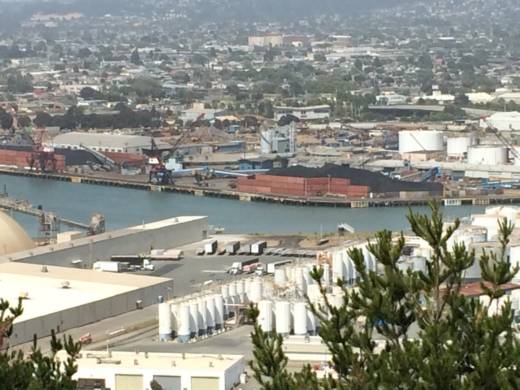Holland's statement prompted a critical response from Council members Ada Recinos and Melvin Willis.
"It's a lot of corporate tradition to threaten jobs and lost livelihood to bully communities to not take action," Recinos said. "We will not be intimidated."
"You as a company need to understand that it's our job to keep our community members from being exploited, harm to their health or anything physical that happens to you," Willis said. "... You basically threatened your employees, saying, 'If the city passes this policy be prepared for layoffs,' and that's disrespectful to the employees."
Contra Costa County Supervisor John Gioia, who serves on the Bay Area Air Quality Management District board, appeared as a public commenter at the meeting. He said the air agency is prepared to start working with the city immediately to begin monitoring for coal dust emissions.
Original post: The Richmond City Council will consider a proposal Tuesday night that aims to limit the release of coal dust from a private terminal at the city's port.
Amid a spike in shipments of the fuel through the Levin-Richmond Terminal, Mayor Tom Butt is asking for approval of an ordinance that would mark a beginning in dealing with local concern over the potential health hazards posed by dust from coal and another sooty material, petroleum coke.
Tiny particles in the dust can be inhaled and drawn deep into the lungs and have been implicated in a wide range of health impacts, including respiratory and heart disease.
The proposal "essentially requires closed storage and closed transfer for coal and petroleum coke," Butt said in an interview last week. If adopted, the measure would take effect in 2020. Levin-Richmond representatives did not respond to requests for comment.
Butt said the draft ordinance is patterned after a regulation adopted in the early 1980s by the Los Angeles area's South Coast Air Quality Management -- home to the port of Long Beach, which handles millions of tons of coal and petcoke every year.
The proposal was prompted in part by the recent disclosure that coal exports through the Levin-Richmond facility spiked last year.
Export statistics from the U.S. Census Bureau show that shipments through the facility have varied widely since they began in 2013. The Levin terminal handled about 453,000 metric tons of coal in 2015, 120,000 metric tons in 2016 and nearly 1.1 million tons last year.
Coal tonnage also surged last year at the state's two other major export facilities, in Stockton and Long Beach. The major destination for coal shipped from all three ports: Japan, which has been beefing up conventional power generation capacity in the wake of the 2011 Fukushima nuclear disaster.
Butt also noted the draft ordinance comes after a 2015 City Council resolution asking the Bay Area Air Quality Management District to require improved storage, handling and transfer of coal and petcoke.
"Three years have gone by now and they haven't taken any action on it," Butt said. "So we're kind of getting tired of waiting."
The air district says it's close to the end of a marathon process to amend its rules regarding how to reduce particulate emissions from commercial and industrial operations.
The precise extent of coal and petcoke dust emissions in Richmond -- including the dispersal of "fugitive" dust from rail cars and trucks -- has not been formally quantified. But the dramatic increase in exports and anecdotal evidence, like a black residue that some residents say they've observed on their homes and yards, has helped fuel the No Coal in Richmond campaign to end shipments through the city.
